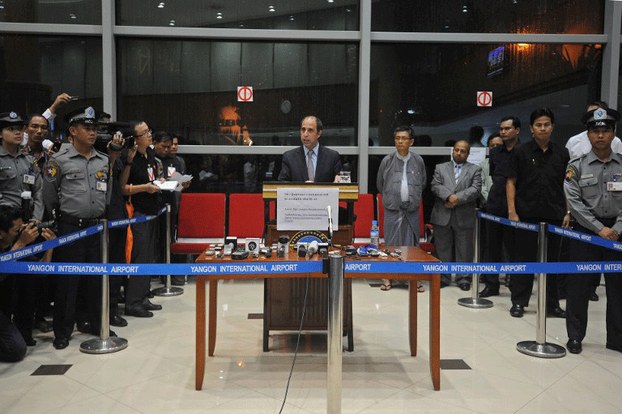




A U.N. human rights envoy on a trip to Myanmar said Wednesday that he had to abandon a visit to a refugee camp in a town reeling from communal violence after his car was attacked by a mob, blaming the authorities for leaving him "totally unprotected" from a "serious" security threat.
Tomas Ojea Quintana, the special rapporteur on the situation of human rights in Myanmar, said that his experience on Monday in central Myanmar's Meikhtila town, which was rocked by riots between Buddhists and Muslims in March, reminded him of the fear that had gripped residents during the violence then.
He said that on his way to the township administrative office late at night, a crowd of around 200 angry Buddhists descended upon his car and proceeded to punch and kick the windows and doors of the vehicle while shouting abuse.
"Due to these serious security concerns, I had to abandon my proposed visit to an IDP [internally displaced persons] camp containing around 1,600 Muslims who had been displaced following the March violence, a visit which had been planned well in advance," he said in a Yangon airport statement before he left after a 10-day visit to the country.
"The fear that I felt during this incident, being left totally unprotected by the nearby police, gave me an insight into the fear residents would have felt when being chased down by violent mobs during the violence last March as police allegedly stood by as angry mobs beat, stabbed, and burned to death some 43 people," he said.
He did not identify those who attacked his car in the statement but the Associated Press quoted him as saying that they were Buddhists.
He highlighted in the statement the government's obligation "to act immediately to control violent mobs running riot in communities, and protect all people regardless of their religion or ethnicity—something it seems they have not done during the violence in [Meikhtila]."
"The Government also has an obligation to hold to account those who have failed to carry out this duty," he said after the visit, his eighth to Myanmar since he was appointed special rapporteur in March 2008.
Quarrel
The Meikhtila clashes were sparked by a quarrel between a Buddhist couple and the Muslim owner of a goldsmith shop in the town which spread to other towns in central Myanmar and raged for more than a week, leaving more than 40 dead and 12,000 displaced—most of them Muslims.
Following the violence, seven Muslims were sentenced to between two years and life in prison over the death of a Buddhist monk and an equal number of Buddhists were jailed for their roles in an Islamic school massacre.
International rights groups have accused local authorities of complicity in the violence, saying security forces stood by and watched while attackers burned down entire neighborhoods.
Although officials had declared that trust had been restored in Meikhtila, "this does not reflect reality," Quintana said.
"The central and state government has also an obligation to urgently address these worrying trends," he said.
The Meikhtila violence had suggested that religious tensions in overwhelmingly Buddhist Myanmar were not limited to western Rakhine state, where two separate outbreaks of violence between Muslim Rohingyas and Buddhist Rakhines last year left nearly 200 dead and 140,000 displaced.
Quintana said during his visit to Rakhine state, his overriding concern was that the "separation and segregation" of Muslim and Buddhist communities was becoming "increasingly permanent, making the restoration of trust difficult."
"This continues to have a particularly negative impact on the Muslim community. The severe restrictions on freedom of movement in Muslim IDP camps and villages remain in place," he said.
Citing his visit to Aung Mingalar, the only remaining Muslim ward in Rakhine state's capital Sittwe, he said a large number of people were living in a confined space, with the periphery marked out with barbed wire and guarded by armed police.
'One-sided'
During his Rakhine visit, a group of Buddhist residents staged protests and called his reports on the ethnic violence “one-sided” in favor of the Rohingya group.
But Quintana stood his ground, saying that he remains impartial.
In his statement, Quintana also expressed concern over issues linked to relief, rehabilitation, and resettlement of refugees in northern Kachin state which were covered under a seven-point peace agreement signed in May by the government and the Kachin Independence Organization (KIO), the political wing of the Kachin Independence Army (KIA) rebel movement.
"I learnt that U.N. humanitarian agencies had only been provided with access to non-government controlled areas once between July 2012 and July 2013. The information I have received about these areas is extremely concerning, particularly with regard to food security," he said.
He said he also attempted to visit Laiza, a KIA stronghold, during the mission, but the state and central governments were unable to grant him clear permission.
"This pattern of denying access not only to address humanitarian shortcomings, but also serious human rights concerns, needs to change immediately," Quintana said.
He said that over the years there have been serious allegations of human rights abuses against villagers from Kachin, though he believed these have reduced following progress with ceasefire negotiations.
Quintana thanked the government for granting him an extended visit this time, which has enabled him to cover more ground than he had done previously during his five-day missions.
He also visited the Chin and Shan states and met with government ministers, opposition leader Aung San Suu Kyi and other members of parliament, as well as several political prisoners in the main Insein prison.
Reported by RFA's Myanmar Service. Written in English by Parameswaran Ponnudurai.